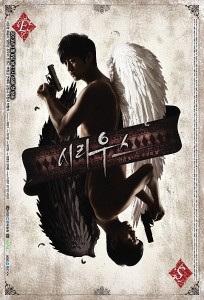 While looking for something short that wouldn’t commit me for weeks like a drama, I ran into the KBS Drama Special Series and Sirius. As a four episode set with each episode lasting an hour, it seemed like a fairly good distraction, only made sweeter by the existence of English subtitles for the series. I expected to watch an episode a day while I had spare time, to enjoy it slowly while I ate or something along those lines.
While looking for something short that wouldn’t commit me for weeks like a drama, I ran into the KBS Drama Special Series and Sirius. As a four episode set with each episode lasting an hour, it seemed like a fairly good distraction, only made sweeter by the existence of English subtitles for the series. I expected to watch an episode a day while I had spare time, to enjoy it slowly while I ate or something along those lines.
Instead I found myself consistently pressing the play button for the next button as I internally cringed at turning the separated hours into a four-hour marathon, relegating all other work for later. And that was before I got to episode four, which turned me into a bawling mess in the wee hours of the morning.
The KBS Drama Special is a compilation of individual episodes that are complete stories in themselves, each episode featuring different actors and production teams. It has run through three seasons so far, usually airing from somewhere around the middle of the year until the end. The Drama Special Series are similar to the Drama Special except there are multiple episodes per story: not as short as the Drama Special, but nowhere near as long as a full-length drama. These tend to the run in the time when the Drama Special season isn’t airing, or from the end of one year into the summer of the next.
Spoilers. Spoilers. Spoilers.
Sirius is the start of the third season of Drama Special Series, a four episode sequence full of twins, switching identities, and battles with drugs. Here’s a quick recap: Do Shin-wu and Do Eun-chang are twins, the younger versions played by ZE:A‘s Park Hyung-shik while the older is Seo Jun-yeong. The twins have drastically different lives with the livelier Eun-chang receiving more love from their mother while the quieter Shin-wu suffers bullying and neglect. The event that changes the lives of the family is the accidental murder committed by Eun-chang of one of Shin-wu’s bullies. 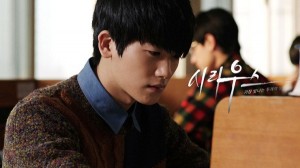 It lands him in prison, effectively taking away some of his best years, and drives his mother to heartbreak. Once all grown up, we hear that the mother has died, taken by extensive use of drugs, Shin-wu is a police chief, and Eun-chang is making ends meet as a delivery boy. The brothers rarely, if ever communicate, primarily due to Shin-wu’s personal guilt and insecurities, though Eun-chang is full of his own issues.
It lands him in prison, effectively taking away some of his best years, and drives his mother to heartbreak. Once all grown up, we hear that the mother has died, taken by extensive use of drugs, Shin-wu is a police chief, and Eun-chang is making ends meet as a delivery boy. The brothers rarely, if ever communicate, primarily due to Shin-wu’s personal guilt and insecurities, though Eun-chang is full of his own issues.
The two are forced to meet when one of Shin-wu’s drug investigations takes a bloody turn, eventually killing Eun-chang’s girlfriend, taking Shin-wu as hostage, and implementing Eun-chang, previously unknown to Shin-wu’s colleagues, as chief, switching effectively switching identities. As a result, there’s a push-and-pull game between President Go Seok-min, drug dealer with high aspirations of his own, played by Ryu Seung-soo, and the Do brothers as the latter, particularly Shin-wu, attempts to catch the former in his drug dealing ways. The end is definitely not pretty, but President Go does get nabbed in the act, eventually meeting his death by betrayal of one of his own, and the woman to whom he supplies a large portion of product also gets behind bars. But it’s not without its costs: there’s, as already mentioned, the death of Eun-chang’s girlfriend who was also working in President Go’s club to provide information to Shin-wu, and the shaky condition of Eun-chang himself who suffered an overdose of drugs while in President Go’s hands.
One of the best aspects of this drama, without a doubt, is the way one character plays two. The sheer difference in expression done by both Hyung-shik and Seo Jun-yeong make it very clear who is who at any given time. Even when one twin is playing the other, there is a distinct sense that the twin is playing their perception of the other, of course aided by the viewer’s knowledge of who is actually the original twin. Eun-chang tends to have more smiles with a higher-pitched voice and hair down in the front while Shin-wu is more stoic, has a lower-pitched voice, and combs his hair off to the side. It’s these little things that had me looking back and forth not believing the two were the same person for a good portion of the first episode.
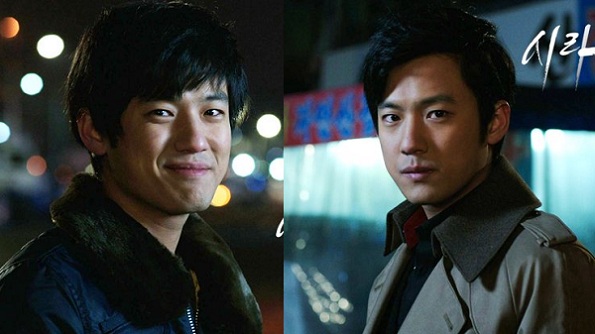 The structure of each episode also was well done to incorporate flashbacks to home life as a family of three that were relevant to the story. It’s through these that we learn that the mother of the twins left Shin-wu at an orphanage for seven years because she simply could not support two children as a single mother. We learn that Shin-wu has had his hand at playing Eun-chang to ease his mother’s addled mind. And we also see that the reason Shin-wu is so adamant about nailing those drug perpetrators is because of the state his mother was reduced to at the hands of the liquid drug in question and her eventual death. Those instances really put into perspective how the family was so fragmented from the start, certainly not helped by the mother’s inability to convey her emotions towards Shin-wu, which perpetuated the image of only caring for Eun-chang.
The structure of each episode also was well done to incorporate flashbacks to home life as a family of three that were relevant to the story. It’s through these that we learn that the mother of the twins left Shin-wu at an orphanage for seven years because she simply could not support two children as a single mother. We learn that Shin-wu has had his hand at playing Eun-chang to ease his mother’s addled mind. And we also see that the reason Shin-wu is so adamant about nailing those drug perpetrators is because of the state his mother was reduced to at the hands of the liquid drug in question and her eventual death. Those instances really put into perspective how the family was so fragmented from the start, certainly not helped by the mother’s inability to convey her emotions towards Shin-wu, which perpetuated the image of only caring for Eun-chang.
Despite all the time apart, the brothers remain so similar even in their different roles. Though Shin-wu is the one with more power as a police chief, Eun-chang is still saving him and helping him out, doing it twice in the four episodes: once while acting as Shin-wu to keep his torture minimal and once to get Shin-wu’s attackers off of his trail. And of course, there’s the instance during their school days where Eun-chang fights Shin-wu’s bullies. The two also take turns playing one another: Eun-chang playing Shin-wu in school to fend off bullies, Shin-wu playing Eun-chang to help his mother, Eun-chang playing Shin-wu again when he’s forced to act as police chief, Shin-wu playing Eun-chang in order to nail a supposed drug deal, and lastly, Eun-chang playing Shin-wu to let Shin-wu get away to find the actual stash of drugs. 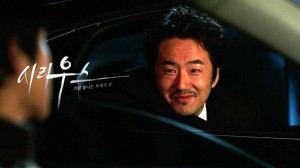 Neither enjoy acting as the other, especially with the consequences of the actions, yet they keep having to do so when the circumstances pop up. And in addition, both have matured through hard times–prison and growing up supporting one’s self–to the point where they are better people for it but still harbor guilt from the past.
Neither enjoy acting as the other, especially with the consequences of the actions, yet they keep having to do so when the circumstances pop up. And in addition, both have matured through hard times–prison and growing up supporting one’s self–to the point where they are better people for it but still harbor guilt from the past.
And of course, the drama can’t be discussed without mentioning the effect of narcotics on the Do family along with its extrapolation to any family involved with the substance. Within the drama, there are two clear examples of abuse and its effects: the mother, who was introduced to what was supposedly an energy drink, and the drug addict from the very first episode that Shin-wu catches but loses. It’s this very same person that later is persuaded to drive the vehicle that kill’s Eun-chang’s girlfriend and harms Do Shin-wu in exchange for more drugs. It’s this strive towards eliminating drugs, especially those of the kind found in the drinks the mother consumed, that perpetuates Shin-wu’s career and leaves him blind to most other aspects. Because Eun-chang wasn’t available during the period of time that his mother took up the substance, Shin-wu feels responsible for her death, feels guilty he couldn’t keep her well until Eun-chang was out, a sentiment that also contributes to his personal inability to face Eun-chang once we got out of prison.
The ending was done in a particularly satisfying manner. Eun-chang didn’t suddenly get better to end the series in a bubble of sunshine. There was a sense of reconciliation through this otherworldly travel the two took, but Eun-chang is still in coma fighting for his life due to the forced overdose right until the end. While it certainly left me in tears questioning why I started this drama if it was going to suck the water out of me, it was also a good way to end the drama. 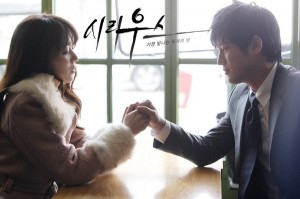 The uncertainty leaves the drama in limbo as to the question of Eun-chang’s life but simultaneously lets us know that if he does get better, his relationship with Shin-wu will have improved, and if he doesn’t, Shin-wu will still be a changed person, for the better.
The uncertainty leaves the drama in limbo as to the question of Eun-chang’s life but simultaneously lets us know that if he does get better, his relationship with Shin-wu will have improved, and if he doesn’t, Shin-wu will still be a changed person, for the better.
There are several more aspects that could be discussed about this drama, but those were some of my favorites that really had me thinking. At four episodes, the drama wasn’t too short or too long; the Drama Special Series format suited the drama well as I can’t think of how the plot could have been extended without adding some type of filler to it. I strongly recommend giving the series a shot though you should definitely keep those tissues nearby in the latter episodes.
Have any of you given Sirius a try? If so, what were your favorite parts of the drama?
(KBS/KBS2)


